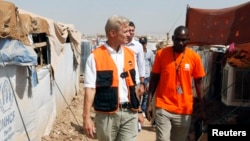GENEVA —
The Norwegian Refugee Council notes about two-thirds of them a A new report says a total of 33.3 million people around the globe were internally displaced by conflict and violence as of December. That number includes 8.2 million driven from their homes during 2013 alone.
The report by the Norwegian Refugee Council notes about two-thirds of the 33.3 million internally displaced people are in just five countries: Syria, Colombia, Nigeria, DRC and Sudan.
This is the first time Nigeria is included in these global statistics and the report documents 3.3 million Nigerians displaced within their own country.
The secretary-general of the Norwegian Refugee Council, Jan Egeland, says that number includes nearly half a million driven from their homes during 2013.
“Of the 470,000 displaced in Nigeria last year, about 300,000 were displaced due to Boko Haram - the conflict between Boko Haram and counter-insurgency forces and violence from Boko Haram - 170,000 displaced by inter-communal strife in Nigeria - 470,000 altogether,” he said.
The report says Syria has the highest total of IDPs, 6.5 million. Egeland calls Syria the epicenter of violent forced displacement. Every day 9,500 people - about one family every 60 seconds - is being displaced in Syria.
Egeland cites the Central African Republic as another exploding crisis, with nearly one million people newly displaced.
He also points to South Sudan, where 380,000 people became displaced in 2013, and the total now has reached one million.
Egeland says people who are displaced in their own countries are in a state of absolute crisis. Because they have not crossed a border, they are not entitled to the same international protections afforded refugees. He says they are unprotected, extremely vulnerable and very often lack assistance.
He says the figures in the report are the worst since the international community began recording internally displaced figures in 1989.
“It is worse than the bleakest and blackest hours of the 1990s, with the genocides in Bosnia and elsewhere in the Balkans and in Rwanda and in the Congo. At that time it... peaked around 28 million and then we had a decrease. We are now talking 1995-96. Since 2000, there has been a relentless increase in the number of internally displaced, but the last two years have been by far the worst,” he said.
Egeland says he fears the number of people fleeing their homes will continue to escalate. He says nations must work more closely together to end this misery for millions.
The report by the Norwegian Refugee Council notes about two-thirds of the 33.3 million internally displaced people are in just five countries: Syria, Colombia, Nigeria, DRC and Sudan.
This is the first time Nigeria is included in these global statistics and the report documents 3.3 million Nigerians displaced within their own country.
The secretary-general of the Norwegian Refugee Council, Jan Egeland, says that number includes nearly half a million driven from their homes during 2013.
“Of the 470,000 displaced in Nigeria last year, about 300,000 were displaced due to Boko Haram - the conflict between Boko Haram and counter-insurgency forces and violence from Boko Haram - 170,000 displaced by inter-communal strife in Nigeria - 470,000 altogether,” he said.
The report says Syria has the highest total of IDPs, 6.5 million. Egeland calls Syria the epicenter of violent forced displacement. Every day 9,500 people - about one family every 60 seconds - is being displaced in Syria.
Egeland cites the Central African Republic as another exploding crisis, with nearly one million people newly displaced.
He also points to South Sudan, where 380,000 people became displaced in 2013, and the total now has reached one million.
Egeland says people who are displaced in their own countries are in a state of absolute crisis. Because they have not crossed a border, they are not entitled to the same international protections afforded refugees. He says they are unprotected, extremely vulnerable and very often lack assistance.
He says the figures in the report are the worst since the international community began recording internally displaced figures in 1989.
“It is worse than the bleakest and blackest hours of the 1990s, with the genocides in Bosnia and elsewhere in the Balkans and in Rwanda and in the Congo. At that time it... peaked around 28 million and then we had a decrease. We are now talking 1995-96. Since 2000, there has been a relentless increase in the number of internally displaced, but the last two years have been by far the worst,” he said.
Egeland says he fears the number of people fleeing their homes will continue to escalate. He says nations must work more closely together to end this misery for millions.












